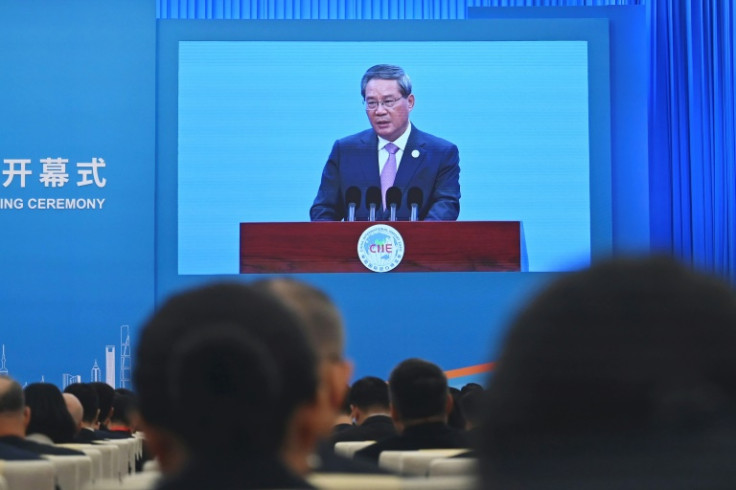
Chinese Premier Li Qiang said Tuesday he was "fully confident" the country would hit its economic goals this year, lauding recent stimulus measures and suggesting there was still room for more.
Beijing has set a growth target of around five percent for 2024, but in the third quarter the country saw its slowest expansion in a year and a half as its post-pandemic recovery remained stubbornly uneven.
The government has announced a raft of measures aimed at boosting activity, including rate cuts and the easing of some home purchasing restrictions, but analysts have criticised the lack of detail so far.
Observers hope a specific figure for the stimulus could emerge from this week's meeting of the Standing Committee of the National People's Congress (NPC), the top body of China's rubber stamp parliament, in Beijing.
Speaking Tuesday at the opening ceremony of a major international trade show in Shanghai, Li said: "We are fully confident in the realisation of this year's goals and the development of China's economy in the future."
The premier, who has official responsibility for economic policy, suggested that authorities still had room to manoeuvre when it came to further measures.
"In the face of downward economic pressure, we have the requirements for increasing counter-cyclical adjustments," he said. "There is a relatively large space for financial and monetary policies, and the policy tools are even more abundant."
An initial market rally when the measures were announced has since fizzled out, with investors put out by the lack of detail.
But there have been glimmers of hope for the economy recently, including China's manufacturing output expanding for the first time in six months in October.
Activity in China's services sector also accelerated in October, according to an independent index published on Tuesday.
The Purchasing Managers' Index (PMI) for services, calculated by S&P Global and Chinese business media Caixin, stood at 52 points, up from 50.3 in September. The figure is the best since July and anything above 50 is regarded as growth.
The NPC standing committee meeting this week has a review of financial work on the agenda, Beijing said.
And on Monday lawmakers reviewed a bill that would raise local government debt ceilings to replace existing hidden debts, according to state news agency Xinhua.
Another challenge facing the economy is escalating trade rows with several key trading partners -- most notably the European Union and the United States.
Speaking at the China International Import Expo (CIIE), an annual showcase trade show in financial hub Shanghai, Li insisted China was committed to opening up further to foreign investment.
Before an audience that included a posse of foreign dignitaries, including the Malaysian, Slovakian and Serbian prime ministers, Li warned against rising unilateralism and protectionism.
"From a global perspective, many issues that should not be a problem have often emerged since opening up, in particular, all kinds of dishonest behaviours, which have caused the broken window effect that destroys rules," he said, referring to a theory that visible signs of crime encourage further lawlessness.
China has railed against tariffs on its electric vehicles imposed by the EU and Washington among others.
Beijing last month announced provisional tariffs on EU brandy imports, and has also initiated anti-dumping probes into some EU pork and dairy imports.
French trade minister Sophie Primas, who is attending the CIIE, told AFP on Monday that the window for negotiation remained "open" but warned France would take all possible measures over provisional tariffs on European brandy.







